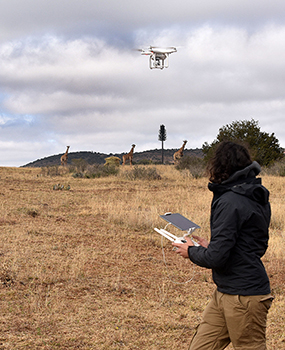
Technology was used in filming the giraffes.
According to research, giraffes will slow
down when a drone is positioned
approximately 20 - 30 m away. When the
drone moves closer, they will revert
to galloping.
Photo: Charl Devenish
The meaning of the Arab term Giraffe Camelopardalis is ‘someone who walks fast’. It is precisely this locomotion of their longnecks that encouraged researchers, Dr Francois Deacon and Dr Chris Basu, to study the animals more closely.
Despite the fact that giraffes are such well-known animals, very little research has been done on the manner in which these graceful animals locomote from one place to the next. There are only two known ways of locomotion: the slower lateral walking and the faster galloping. Most animals use these ways of moving forward. It is unknown why giraffes avoid intermediate-speed trotting.
Research of great value to the industry
Research on the manner in which giraffes locomote from one place to the next will assist the industry in understanding aspects such as their anatomy and function, as well as the energy they utilise in locomoting from one place to another. Information on the latter could help researchers understand where giraffes fit into the ecosystem. This data is of great value for large-scale conservation efforts.
Universities working together to collect data
Dr Basu, a veterinarian at the Royal Veterinary College in the UK, has studied the animals at a zoo park in the United Kingdom. He visited the University of the Free State (UFS) in order to expand his fieldwork on the locomotion of giraffes. This study was done in cooperation with Dr Deacon from the Department of Animal, Wildlife, and Grassland Sciences at the UFS. Dr Deacon is a specialist in giraffe habitat-related research in South Africa and other African countries.
The fieldwork for the research, which was done in the Woodland Hills Wildlife Estate and the Willem Pretorius Nature Reserve, preceded research on the movement and the forces involved in the locomotion of giraffes. Due to the confined fenced area in the zoo park, it was practically impossible to study the animals at speed. “The study of actions ‘faster than walking’ is crucial for gathering data on, inter alia, the frequency, length, and time associated with each step.
Technology such as drones offers unique
opportunities to study animals like giraffes.
Technology used to ensure accuracyTechnology such as drones offers unique opportunities to study animals like giraffes. Apart from the fact that it is possible to get high-quality video material of giraffes – moving at speed – it is also a very controlled device that ensures the accuracy of data.
It is the first time ever that a study has been done on the locomotion of giraffes with this level of detail.
Research on the study will be published in the Journal of Experimental Biology.
The project was approved by the UFS ethics committee.
Previous research articles:
9 March 2016:Giraffe research broadcast on National Geographic channel
18 Sept 2015 Researchers reach out across continents in giraffe research
29 May 2015: Researchers international leaders in satellite tracking in the wildlife environment